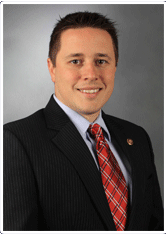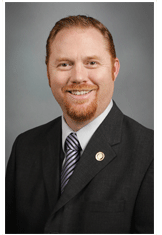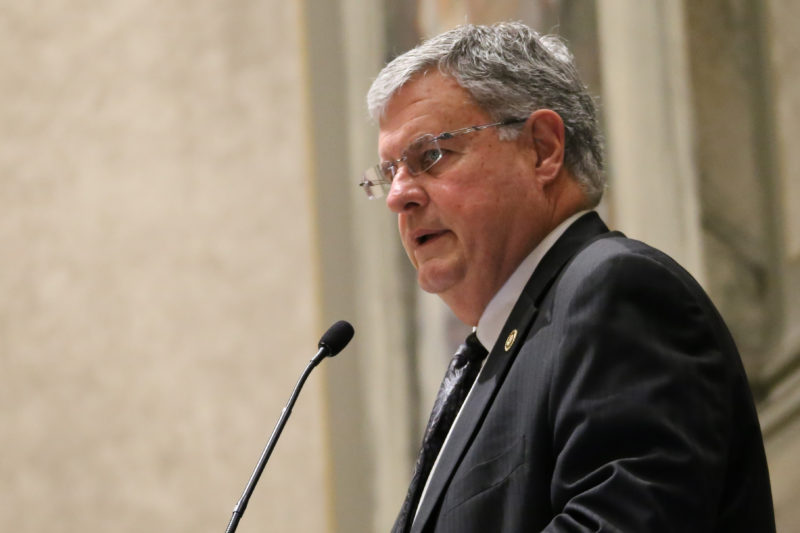JEFFERSON CITY, Mo. – 2017 has been a dream session for Missouri Republicans. Riding the coattails of President Donald Trump’s victory, Missourians elected both Republican supermajorities and a Republican governor for the first time in state history.
Since then, Missouri has seen several core conservative ideas passed through the legislature, including the controversial issue of right-to-work. For many Republicans, it was a long time coming.
“If all we did is get right-to-work and the budget done, it still would be one heck of a year,” Senate President Pro Tem Ron Richard said.
Last week, the Missouri Senate took a moment out of this whirlwind session to remember former senators who had passed. During that service, former Sen. Jim Mathewson told the story of Earl Blackwell, the Senate President Pro Tem who, for the first time, forced the Senate to move the previous question, which is known as the PQ.
In 1970, the president of the Senate would not follow the will of the Senate and raise income taxes, which Gov. Warren Hearnes said was necessary to pay the state’s bills. Blackwell, the Senator from Jefferson County, was at odds with the majority of the body and would not compromise, at which point the body moved the previous question to shut off debate for the first time in the history of the body.
Within a week, the Senate had removed him as Pro Tem and two years later, he came in last in a four-way primary for governor.
From the previous question to the location of the inauguration, the President Pro Tem of the Senate stands as one of the last checks on preserving many of the traditions of Missouri, including a deliberative Senate and the restraint of moving the previous question.
Richard has used just about every legislative tactic within the rules to pass legislation during his time as Speaker of the House and President of the Senate, and while many look at the upper chamber and question the speed at which the body passes legislation, Richard says that’s the way the state’s founders intended.
“We’re supposed to be slow and deliberate,” he said. “People need to not get in a hurry, we’ll get to it in due time. The power of the Senate is in the individual senators, not in me, and that’s why the Senate is effective.”

Richard says that the decorum of the Senate is key to the process, from the passage of legislation to something as minute as ruling on a point of order. He says he tries to look at how the previous senators had handled it before him, noting that the traditions and rules are what set the Senate apart from their House counterparts.
But the PQ has always been looked upon as a somewhat questionable way for a statesman to use to pass legislation, almost a last resort of sorts. Richard says that the use of the PQ is to serve as a balancing factor against a filibuster, but says that when it comes to the usage of the PQ, he prefers only to do it when the senator handling the bill asks for it, and that unless they have 18 votes for the motion, and even then it bears a lot of scrutiny.
“The Senate has used it sparingly over time because it’s hard for people to go for it. It takes five to sign a letter, but history says you need 18,” he said. “Until someone comes to me with 18, I’m going to take a jaundiced look.”
And while some zealots have begun to wonder why the Senate just doesn’t PQ each issue and churn out more bills similar to the House, Richard prefers to be protective of using PQs in the Senate. He notes that most Republicans would prefer less government and that much of the work is done in committees, saying that is the purpose of having them.
Another interesting mix into the equation is the addition of first-time politician, Gov. Eric Greitens, who is new to the legislative process and seems to favor more legislation to be passed by the chambers, looking to further his agenda and make good on campaign promises.
“He’s got an agenda, but every governor does,” Richard said. “But really, most of the things he wants, we’ve been trying to pass since Matt Blunt was in office.”
But is Richard concerned about the direction the Senate could go when he leaves? When asked that question, Richard took a breath, and then responded.
“There’s always a danger in opening the floodgates,” he said.
That begs the question, however, of whether the Senate will see the notorious PQ being used this session. Most believe it could happen, but all seem to hope that will not be the case. Several senators chimed in on the topic.
Sen. Jason Holsman:

From 1821 to 1969, the Missouri Senate never moved the previous question to end debate. For 148 years through the Civil War, Great Depression, WWI, and WWII, no issue rose to the importance of limiting a Senator’s speech. Since 2000 the Republican majority has deployed the “nuclear option” 14 times to advance their political ideology. The Founding Fathers designed the Senate to be a deliberative body. Every time the PQ is moved, the decorum and prestige of the chamber erodes. Term limits have led individual members to possess a sense of urgency to get something done. The impatience can be a catalyst to destroy the relationships which are necessary to maintain balance in a chamber of equals.
Sen. Ryan Silvey:
This leadership team has made no qualms about using the PQ. They used the PQ under the Nixon administration on things they knew he would veto and things they knew they couldn’t override the veto for, so that was completely reckless. I think now if they think that they can get something done that they have deemed a priority, they will do it. It’s really disheartening that in just the few years that I have been in the legislature, that this is a discussion that now happens every year. I think the founders were pretty smart guys, I think they were smarter than most of us. I don’t think we should be trampling on the institution that they set up just because of whatever issue of the day. I think it’s more important that we preserve ourselves as we were constitutionally set up than it is to pass any given issue.

Sen. Gina Walsh:
I don’t think people want to use it because it’s really against the Senate stands for. It kind of drags down the Senate, it’s not what we’re about, and it’s supposed to be there as a last option. We try hard and are able to negotiate a compromise most of the time, and that’s what I like to see. If we have differences, let’s try and achieve a compromise somewhere, because then there’s no need to go to a PQ. So far, that’s how it has been, and I hope it stays that way.
The PQ has been used successfully only 15 times since 1970. But the number of PQs used seems to increase as time goes on, with 11 of them taking place since 2003.
In 2013, the Senate failed to vote through a gun measure, called a nullification bill by its critics, despite their use of the PQ. The measure would have made it illegal to enforce federal gun laws in the state, and though it passed the House, it failed by one vote in the Senate. Richard, at the time, spoke up and said he would not pass something he saw as nonsensical.
During the 2014 veto session, usage of the PQ allowed Republicans to overturn Gov. Jay Nixon’s veto of an abortion bill that sought to extend the waiting period for having an abortion from 24 hours to 72 hours, which now stands as current law. But some senators had an issue with the usage of the PQ; Sen. Scott Sifton alluded to the fact that it may not have been the wisest thing to do. Silvey says it was the one time he voted for the PQ, saying that the historical context is there had never been a filibuster in a veto session. He says there’s no reason for a filibuster there other than killing what the Senate had already passed, which he says was in itself breaking in tradition.
Richard also presided over the session in 2015, where a PQ was used to end the filibuster of a right-to-work bill during the last week of the legislative session, leading to its passage in the Senate.
The PQ was also used in March 2016 over the controversial SJR 39, better known as the religious freedom bill. That bill was the subject of a record-setting 39-hour filibuster, which came to a halt with the motion of PQ, and the Senate passed the measure. That measure, however, failed in the House Emerging Issues Committee by a vote of 6-6.
For now, Richard says, as the President Pro Tem, he is ready to fight for the continued values which the Senate has held. In that aspect, he may be one of the last of a dying breed, but if there’s one thing Richard has shown, it’s that he will not back down on that which he believes.
Benjamin Peters was a reporter for The Missouri Times and Missouri Times Magazine and also produced the #MoLeg Podcast. He joined The Missouri Times in 2016 after working as a sports editor and TV news producer in mid-Missouri. Benjamin is a graduate of Missouri State University in Springfield.








